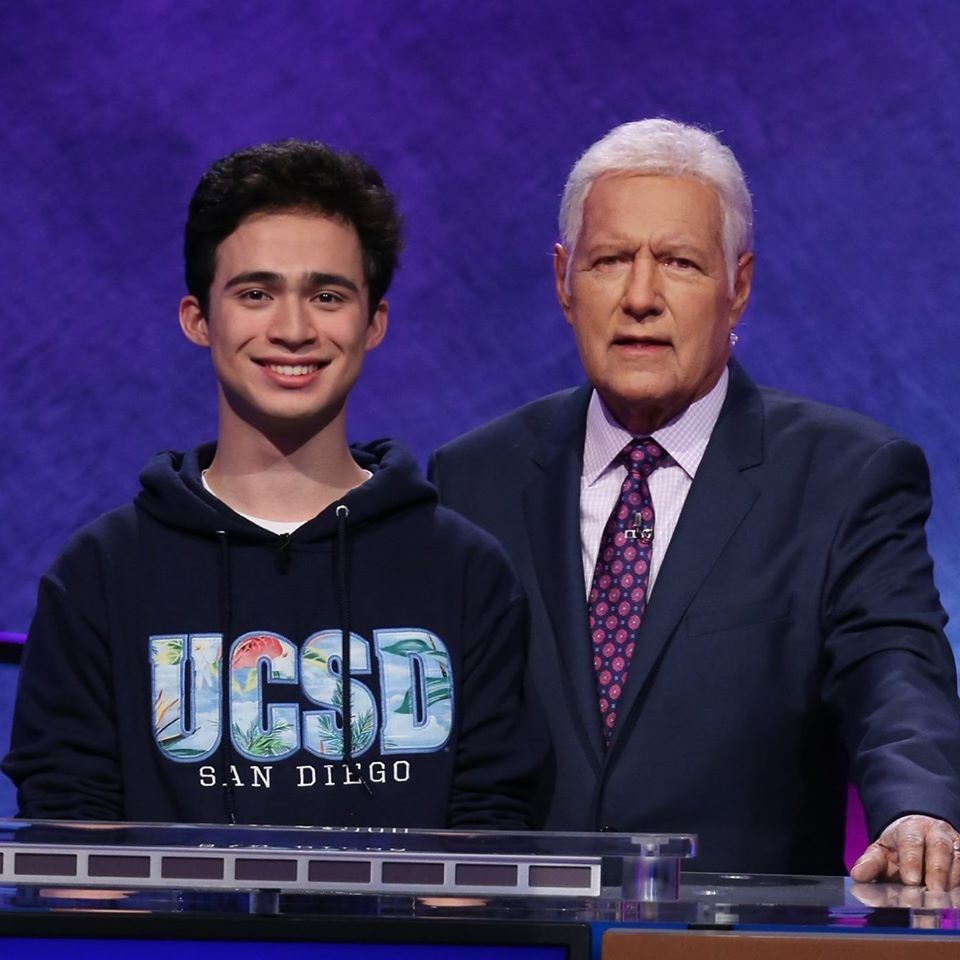 A Quick Q&A With Alistair Gray
A Quick Q&A With Alistair Gray
‘Jeopardy!’ Participant and Linguistics/Computer Science Major
Alistair Gray, a second-year double major in Linguistics and Computer Science at UC San Diego, recently participated in the venerable TV show “Jeopardy!” as one of 15 students selected to compete in the 2020 College Tournament.
Gray, who was heavily involved in his high school’s Quiz Bowl team, is now the incoming president of UC San Diego’s Quiz Bowl Club. He’s also a member of the A Capella Choir – which he loves, he told “Jeopardy!” host Alex Trebek, in part because you don’t have to audition to join.
A native of Sunnyvale, Calif., Gray was exposed to coding from a young age and decided early on to study computer science. “The Lord of the Rings,” meanwhile, is what drew him to linguistics.
In this Q&A, we asked him about his experience as a linguistics major. (Unlike on the show, he gets to answer with answers not questions!) The questions were posed by Ivano Caponigro, associate professor of linguistics at UC San Diego.
Alistair, how did you discover linguistics and when did you start thinking about majoring in linguistics?
Probably the first step towards linguistics for me was reading the appendices of “The Lord of the Rings” as a young child (maybe around 10 or 12?) and being especially fascinated by the ones in which Tolkien describes the languages and writing systems of his fictional world. I was inspired to try constructing my own languages because of that, and through exploring the resources for doing that learned a good bit about the basics of linguistics (the IPA and so on). I also enjoyed learning French in middle school, so I learned some more languages in my free time: I taught myself Latin well enough to take the AP test, good bits of Esperanto and Quenya, of course, and began many others. After all that, it was, I think, fairly natural that I would have some interest in linguistics as a pursuit, and here I am.
What aspects of linguistics have you enjoyed the most so far?
As one could probably predict from my other major, I enjoy the more formal, rule-based side of linguistics more: the fields of syntax and phonology in particular have been very enjoyable. This quarter [Spring 2020] I’m taking Semantics (LIGN 130) and Computational Linguistics (LIGN 165) and looking forward to seeing how they can scratch that itch too.
How do you combine linguistics and computer science? Are they two separate worlds or have you found commonalities and overlaps?
So far, the two fields have been mostly separate, and my interests in linguistics and computer science come from different places. But this will probably change, as I take classes that merge them and discover deeper similarities! I'm very happy with both majors, and even without the overlap would recommend either or both to anyone who's interested in language, cognition, and computation. The intersection of the two fields is really interesting to me, because they're two fields that are trying to converge on a central understanding of the fundamental cognitive problems of language and meaning. Linguistics is traditionally from a top-down, analytic perspective, creating highly abstract rule-based systems from language data, intuition, and cross-linguistic similarity; on the other hand, computer science (or at least the part of it concerned with natural language) often attempts to synthesize language as a child would, from only primary linguistic data. If they're getting closer to each other, then hopefully we're understanding language better! Sorry for the digression, but that's more or less why I love the idea of combining the fields.
What are your plans after graduation?
I'm a pretty indecisive person, so I'm currently pretty undecided between computational linguistics research, computation linguistics industry, CS education, or just software engineering; part of having a double major is so that I can keep my options open, but I'm really going to have to choose at some point. The ideal is probably academia, but all the caveats apply.
How are you dealing with the current challenging situation? Any suggestions (or frustrations) that you would like to share on academic work and social life in this period?
I'm surviving, at least. I don't know; it's a strange and scary situation for all of us, and the best way I've found to keep my mind off of it is to keep busy, whether that's with school, leisure, or anything else. Cooking, running, and watching my friends on the “Jeopardy!” tournament have been some of the things that have worked for me. Social life has actually been better than expected; with everyone in the same situation, it's been easier for me to get friends that would have been physically distant anyways to video-call and catch up.
To read more about Alistair’s experience on “Jeopardy!” (and his impressions of its renowned host), check out this feature in ThisWeek@UCSanDiego.
